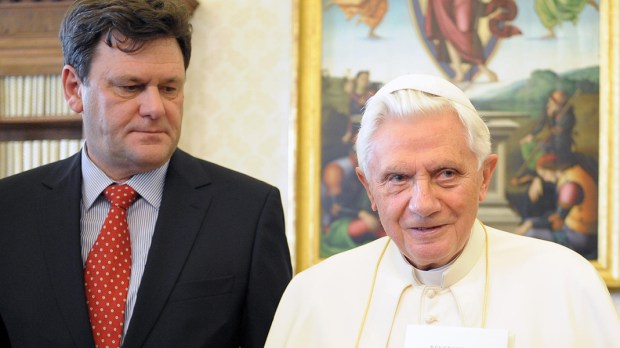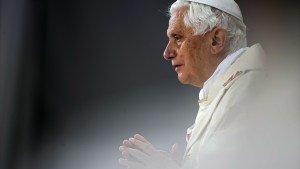“Everything about Benedict XVI seemed modest, unpretentious, accessible. I had left the Church, but I was impressed by the way Ratzinger spoke about love.” Peter Seewald (1954) journalistically accompanied Cardinal Joseph Ratzinger/Benedict XVI, the first Pope Emeritus in centuries, for more than a quarter of a century.
In this exclusive interview for Aleteia, the German journalist highlights the Pope Emeritus’ courage in defending the faith, without regard for popularity and without compromise. He was a genius, loved and hated. “Benedict XVI is a saint. I will miss him terribly.”
“His work will remain.”
“According to Pope Francis, Benedict XVI’s magisterium is indispensable for the future of the Church,” said Seewald, author of the two-volume biographyBenedict XVI: A Life.
What feelings and reflections do these final days in the life of Benedict XVI arouse in you?
On the one hand, I was very sad that the Pope Emeritus ended his earthly life. Sad above all that he had to suffer so much. On the other hand, I wished him a good death for his “homecoming” to eternity, which he had long desired.
Scenes of our many meetings also flashed through my mind. As a former communist and writer for Der Spiegel (a renowned German weekly news magazine, Ed.), I did not feel particularly close to Joseph Ratzinger. That is why I was all the more surprised to meet, during our first meeting in November 1992, a man who had nothing of the prince of the Church about him, and even less of the “Panzer Cardinal” (a term coined by Ratzinger’s critics alluding to tanks used by the Nazis in World War II, Ed.).
Everything about him seemed modest, unpretentious, approachable. I had left the Church, but I was impressed by the way Ratzinger spoke about love. How he showed that religion and science, faith and reason are not opposites.
His way of teaching reminded me of spiritual teachers who do not convince with empty lessons, but with quiet gestures, veiled allusions, and much suffering. Above all, through his own example, which includes integrity, fidelity, courage and a good dose of willingness to suffer.
I found his courage to stand up for his convictions particularly impressive. Even at the cost of popularity. And to resist all attempts to turn the message of Christ into a religion in line with the needs of “civil society.”
“The Church has its light from Christ,” he said. “If it does not capture that light and transmit it, it is nothing more than a dull piece of earth.”
I also liked his serenity, his noble attitude, his humor. Benedict XVI is a saint. I will miss him terribly.
How will Benedict XVI be remembered?
That depends entirely on us and on the evolution of the Church. In any case, Joseph Ratzinger has left a body of work in which he provides important answers to the problems of a society that has lost the sense of God and of a Church that is losing faith.
One thing is certain: with Benedict XVI, the world has lost an exceptional personality. It’s not by chance that he was considered one of the most important intellectuals of the century and the greatest theologian ever to occupy the papal chair. Many consider him the Doctor of the Church of the modern era. In each of his writings his basic attitude is clear: The Church and the faith cannot be made by one for oneself.
If God exists, if revelation exists, if the foundation of Jesus exists, then this does not come from us, but comes as a gift. For his adversaries, he may remain the terrible “Panzer Cardinal,” but millions of Catholics around the world see in him the light on the hill, an icon of orthodoxy by which to orient themselves. His work will live on.
I am pleased to join his successor in this assessment. According to Pope Francis, the magisterium of Benedict XVI is indispensable for the future of the Church. Indeed, “it will “appear ever greater and more powerful from generation to generation.”
What is your last memory of Benedict XVI?
He had been forced by weakness to use a wheelchair for a long time. His spirit was wide awake, but lately his voice had become so weak that it was barely intelligible. At our last meeting, on October 15, what was most palpable was the suffering he carried on his shoulders, his deep sorrow for what was happening in the world and the crisis in the Church, especially in his homeland.
“Why haven’t you died, Papa Benedetto?” I had asked the Pope Emeritus. His answer was that he had to stay, as a “sign.” A sign of the course he was defending; of the message of Jesus, to whose unadulterated transmission he had dedicated his entire life.
“Next time I’ll see you in heaven,” he said, waving goodbye to me. He knew exactly where the journey was headed and what awaited him at his destination. Christ’s promise of eternal life was one of his favorite topics.
“If belonging to the Church has any meaning,” he once said, “it is that it gives us eternal life and, therefore, the just and true life. Everything else is secondary.”


